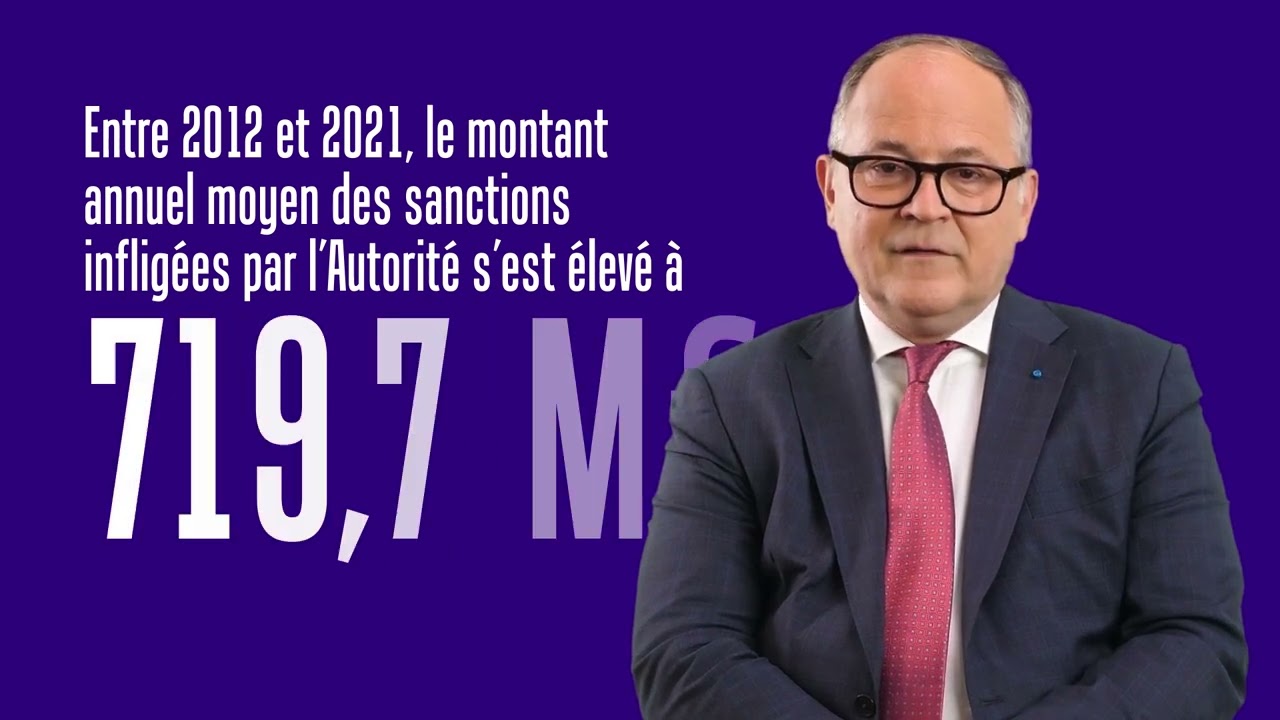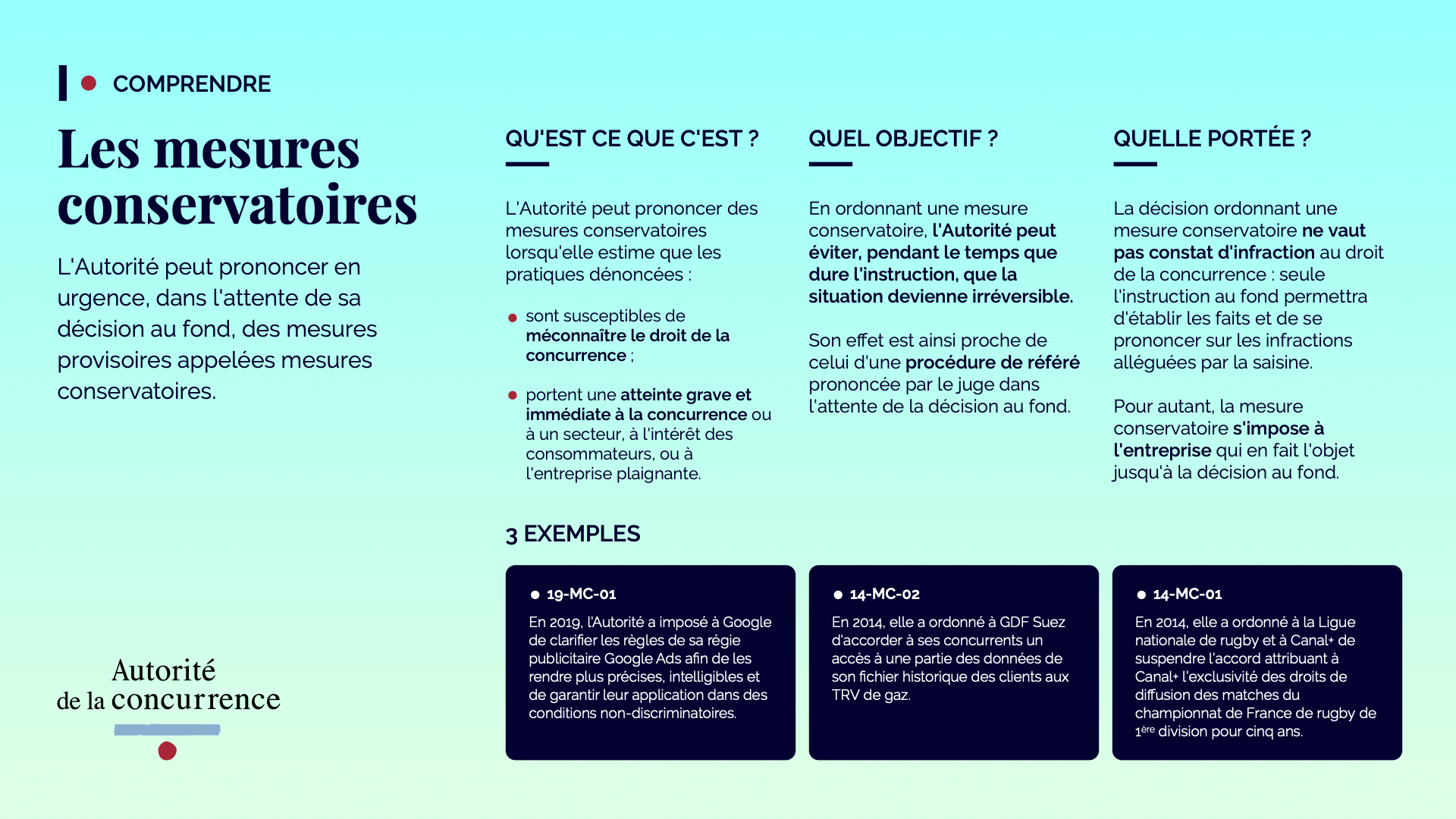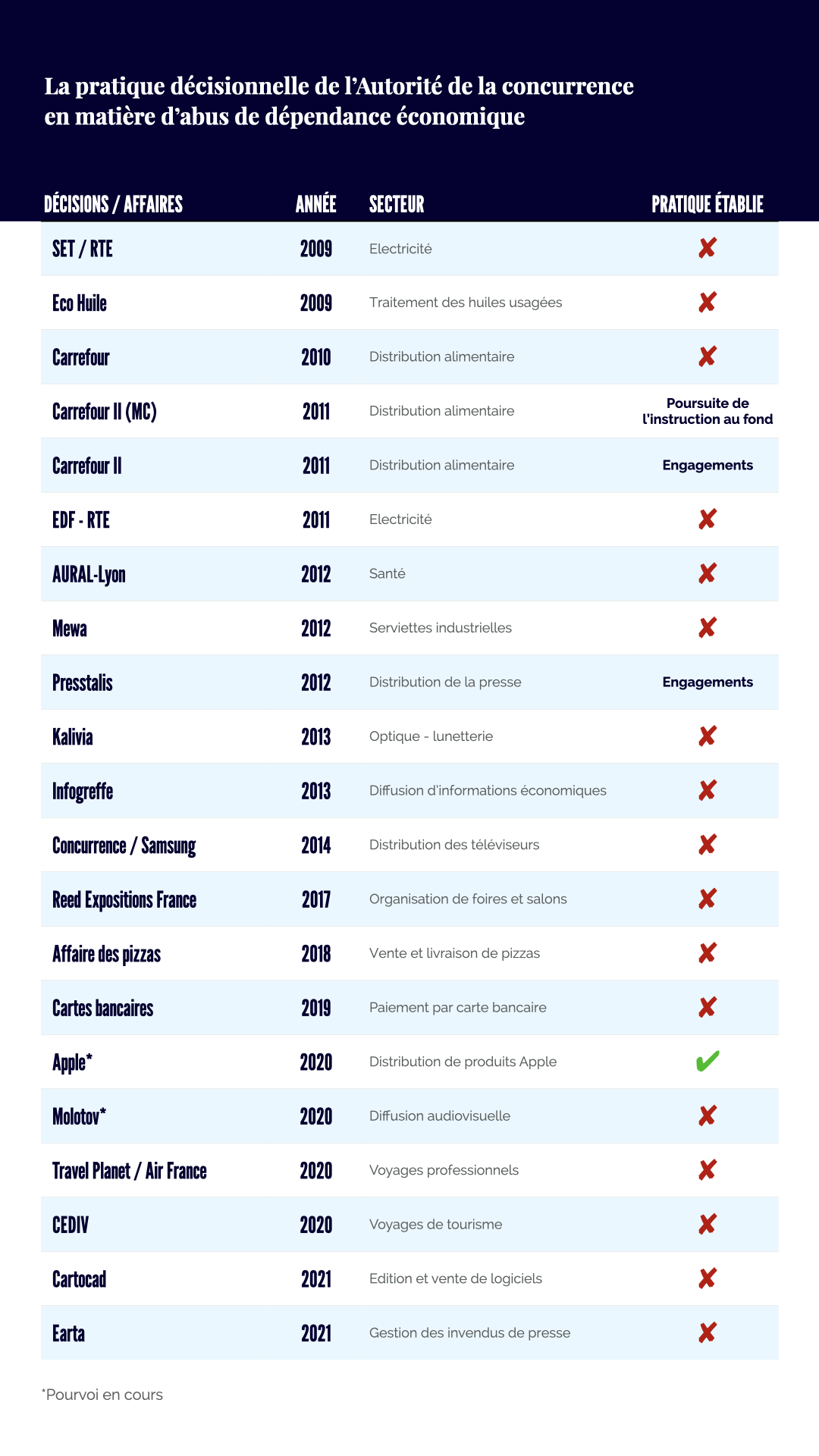Litigation activity
The core function of the Autorité de la concurrence is to prevent and repress anticompetitive practices, which can have a considerable impact on the economy.
The Autorité works every day to ensure that market competition functions properly, thereby protecting consumers and businesses.
Combating anticompetitive practices ensures lower prices and a greater diversity of products and services and gives economic stakeholders assurance they can compete on their own merits on a level playing field.

A quick guide to the litigation activity at the Autorité de la concurrence (in French)
Who can make a referral to the Autorité de la concurrence?
When economic stakeholders are in breach of competition law, a referral can be made to the Autorité by:
- the Minister of the Economy;
- companies;
- local or regional authorities;
- professional bodies and chambers;
- trade unions;
- consumer organisations;
- mayors in the context of their commercial planning powers.
The Autorité can also decide to start proceedings ex officio.
Types of anticompetitive practice
There are two main families of anticompetitive practice: anticompetitive agreements and abuses of dominant position.
Anticompetitive agreements
An anticompetitive agreement is characterised by collusion between several companies that decide to adopt similar practices and behaviour instead of developing independent commercial strategies. This collusion, which distorts market competition, is prohibited.
A distinction is made between “horizontal” agreements, which involve several competing companies, and “vertical” agreements, which involve operators at different levels in the economic chain, e.g. suppliers and distributors.
These agreements can take various forms. Here are some examples:
- agreements on prices, price rises, promotions or margins;
- allocation of markets or customers;
- sharing of confidential or strategic information, e.g. on market share or production costs.
The Autorité operates a leniency programme in order to effectively detect anticompetitive agreements, in particular cartels. Under the programme, a company can report, at any time, its involvement in a cartel and benefit, in exchange, from total or partial immunity from fines. Thanks to the programme, many cartels involving everyday products have been dismantled, for example:
Household appliances cartel
The cartel involved brands well known to the general public such as Bosch, Siemens, Hoover, Electrolux, LG, etc.
In total, nearly 70% of the market was affected. As an example, the jointly agreed price increase was €50 for products costing more than €400.

Abuse of dominant position
Unlike anticompetitive agreements, which are bilateral or multilateral, abuses of dominant position are unilateral practices on the part of a single operator, which uses its dominant position in a market to foreclose the market, exclude competitors or prevent the arrival of new entrants.
Abuses of dominant position can take different forms:
- favouring its own advertising technologies – Google (2021);
- exploiting non-reproducible means held within the framework of a public service mission – EDF (2022);
- tied selling – air freight transport of pets to Polynesia (2022);
- precluding the possibility to exit a supply contract – supply of molasses to La Réunion (2021);
- excluding competitors – SNCF/railway freight (2012);
- exploiting the advantages of a historical monopoly – Engie (2017);
- loyalty rebates – terrestrial TV broadcasting case (2016);
- exclusivity clauses – zinc case (2016);
- excessively high prices – Corsican waste case (2018);
- smear campaigns against new entrants – Durogesic case (2017);
- adopting operating rules that are opaque and difficult to understand and applying those rules in an unfair and random manner – Google Ads case (2019).

Generic medicines: smear campaign punished by a heavy fine
Abuse of economic dependence
Abuse of economic dependence is a unilateral practice whereby an operator abuses the economic dependence of one of its customers or suppliers.
Abuse of economic dependence is established when three cumulative criteria are met:
- The existence of a situation of economic dependence, assessed in concreto based on several objective criteria (the share of the company concerned in the revenue of its partner(s), the reputation of its brand or name, the size of its share in the market in question, and the existence of equivalent solutions for its partner(s)).
- A company allegedly in a situation of economic dependence must be unable to obtain, within a reasonable timeframe, a solution that is technically and economically equivalent to its contractual relationships, either as a customer or as a supplier, with another operator.
- The mere fact that a company derives a very large proportion, or even all, of its supplies or revenue from a single operator is not sufficient to establish a state of economic dependence and must not be the result of a deliberate commercial choice, which must be assessed in concreto.
- In their decision-making practice, the Board and subsequently the Autorité de la concurrence have rarely observed a situation of economic dependence.
- Abusive exploitation of the situation of dependence, through practices that are manifestly abnormal, unbalanced or excessive in view of the circumstances of the case, or that directly or indirectly impose unfair trading conditions (refusal to sell, tie-in sales, discriminatory practices, exclusive distribution arrangements, supply difficulties, unstable remuneration conditions, delisting, discretionary implementation of certain rules, renegotiation of trading conditions without consideration, etc.).
- If such conditions are unfair or abnormal in the light of the circumstances of the case, the Autorité will examine whether they are both necessary and proportionate in relation to any legitimate objective argued by the company concerned.
- An effect on the functioning or structure of competition.
- The effect may be actual or potential, and there is no sensitivity threshold in terms of market share for assessing the effects of an abuse of economic dependence.
Since its creation in 2009, the Autorité de la concurrence has examined possible abuses of economic dependence on several occasions.
Interim measures: for acting in urgent cases
When faced with a situation requiring rapid intervention, the Autorité de la concurrence may order interim measures pending its decision on the merits of a case, where there is a serious and immediate risk to the interests of an economic sector or company.
By ordering interim measures, the Autorité can prevent any practices likely to be anticompetitive from causing serious harm to competition or to the company which is the victim, while an investigation takes place.
Interim measures are ordered very quickly, generally within three to four months of referral.
Since the transposition of the ECN+ Directive in 2021, the Autorité can now order interim measures at its own initiative and no longer only following a request by a company, incidentally to an application on the merits. The Autorité can therefore act without delay, at its own initiative, when it becomes aware of conduct that could harm competition.
Some examples:
- suspension of exclusive iPhone distribution by Orange (2008);
- injunctions against Google to clarify the rules of its online advertising platform (NaVx case in 2010 and Amadeus case in 2019);
- interim measures against Engie concerning pricing and forcing the company to share its files (2014 and 2016);
- injunctions against Google, ordering the company to negotiate with press agencies and publishers regarding the remuneration due under the law on related rights for the re-use of protected content (2020).

What penalties can be expected for anticompetitive agreements or abuses of dominant position?
The penalties imposed by the Autorité have two aims: to penalise the behaviour of the company in question and to deter other companies from engaging in similar practices.
Where it finds that competition rules have been breached, the Autorité can hand out fines and/or issue injunctions.
Each fine handed out by the Autorité is determined on the basis of specific details related to the case and the individual situation of each offende
Fines
Enough to make economic stakeholders think seriously!
Criteria taken into account
To calculate the amount of a fine, the Autorité first decides a basic amount for each company or body that breached the rules. This amount is based a number of criteria, such as the size of the affected market, the seriousness of the actions and the duration of the practices.
The amount of the fine is then adjusted upwards or downwards based on the individual situation of each company or body that breached the rules. The Autorité can adjust the fine to take account of financial difficulties within the company or whether it belongs to a large group. The Autorité can also take extenuating or aggravating circumstances into account (such as recurrence).
To give companies greater clarity, in 2011 the Autorité adopted guidelines, revised in 2021, which set out the methodology used by the Autorité when handing out fines.
Between 2009 and 2021, the Autorité handed out fines totalling over €8 billion. Fines are paid to the State and go into the general budget, thereby helping to fund public spending (on schools, the legal system, hospitals, etc.).
The increase in actions for damages
Victims of anticompetitive practices can use the decisions of the Autorité de la concurrence to bring an action for damages before the competent court in order to obtain the payment of damages. Over the last few years, there has been a sharp increase in actions for damages before the national courts.
A few examples:
- In a decision of 10 February 2021, the Paris Commercial Court granted damages to a company that had been a victim of Google’s practices, based on Autorité Decision 19-D-26, which had fined Google €150 million for enacting opaque listing rules on its Adwords service. The Court ordered Google to pay the victim company the amount of €1,010,532.23 plus €3,598.98 per day from 1 December 2020 until the date of the judgment notification.
- The Paris Court of Appeal has also issued several important judgements. Following Decision 09-D-36 of 9 December 2009, by which the Autorité fined Orange Caraïbe and France Télécom for abuse of a dominant position, in a judgement dated 17 June 2020 the Court ordered France Télécom to pay a company that had suffered from the practices in question the amounts of €173.64 million in lost profits (plus interest) and €737,500 (plus interest), as redress for the additional costs caused by one of the practices.
- Following Decision 15-D-03 of 11 March 2015, by which the Autorité fined an agreement between dairy product manufacturers, in a judgement dated 24 November 2021 the Court of Appeal also granted the respective amounts of €2,044,220 and €332,780 to two distributors, respectively. In a judgement dated 23 February 2022, the Court granted the victim of exclusionary abuse fined by the Autorité in Decision 14-D-02 of 20 February 2014 (sporting press sector) the amount of €1,690,177 in lost profits (plus interest at the legal rate).
- On 20 October 2021, the Strasbourg Administrative Court ordered the members of an agreement in the school bus transport sector in the Bas-Rhin region to pay the local and regional public authorities the amount of €2,022,366 (plus interest).
- On 22 January 2022, the Nantes Administrative Court of Appeal ruled on a request for an advance on the compensation granted to a victim of an agreement on public procurement contracts, following Decision 11-D-07 of 24 February 2011 on practices implemented in the sector for painting services for metal infrastructures. The Court increased the advance to be taken from the compensation to be paid to €280,000.
- In a decision of 27 April 2021, the French Administrative Supreme Court (Conseil d’Etat) ruled on an action for damages concerning the vertical road signs cartel. The Court upheld the judgement of the Administrative Court of Appeal, which had ordered one of the companies involved in the agreement to pay the local and regional public authorities the amount of €4,121,124.
The specialised judicial courts and the administrative courts may seek the opinion of the Autorité regarding the assessment of the loss for which compensation is sought. For example, the Strasbourg Administrative Court sought the opinion of the Autorité in the school bus transport case. Following the observations made by the Autorité, the Court issued a decision on 20 October 2021, sanctioning several of the companies involved in the school bus transport sector in the Bas-Rhin region.
Injunctions
The Autorité can order the perpetrator of anticompetitive practices to cease those practices or change their behaviour to comply with competition law (by amending a clause in general conditions of sale, a contract, etc.).
If the company fails to comply with an injunction, the Autorité can hand out a fine.
Publication injunctions
The Autorité has the power to order that a summary of a decision be published in the press. The purpose is to alert companies in the sector and/or the general public to the harmful nature of the unlawful behaviour.

Fight against anticompetitive practices: a look back at 10 years of action (in French)
Settlement: progress for companies
When a body or company does not contest the objections notified, the General Rapporteur can propose a settlement fixing the maximum and minimum fine that can be handed out, making it easier for companies to predict their financial risk.
The settlement procedure, which replaced the old no contest of objections procedure in 2015, is already widely appreciated by companies.
Settlement has many advantages. For companies, the settlement procedure can bring proceedings to a close more quickly, save procedural costs and lead to a substantial reduction in fines. For the Autorité, the use of the settlement procedure means that certain cases can be brought to a close more quickly, freeing up resources for other cases.
The procedure has met with growing success and was used in particular in the EDF case, the Google (News Corp) case, the floor coverings cartel case, the Engie case, and a case concerning exclusive import agreements in the French overseas territories.
For more information, see the procedural notice on the settlement procedure (in French)

Commitments: building solutions jointly with companies
To quickly restore competition, the Autorité has an alternative to litigation: the commitments procedure.
Following a preliminary evaluation by the Investigation Services, the company can propose commitments to the Autorité to address its competition concerns.
After conducting a market test (the proposed commitments are published on the Autorité website for consultation, to gather comments from interested third parties), the Autorité can accept the commitments, sometimes after seeking certain adjustments, and close the case.
The procedure benefits everyone. The market is the primary beneficiary, because certain situations can be resolved much sooner. The Autorité also avoids the burden of a full investigation and resources are freed up for other cases. Lastly, the company avoids being found in breach of the law and risking a fine.
For more information, see the procedural notice on commitments (in French)
A few examples of the procedure:

Remuneration of related rights by Google
The Autorité accepted the commitments presented by Google to create a framework for negotiation and the sharing of the information necessary for a transparent assessment of the remuneration of related rights, and made the commitments binding.

Online non-search advertising
Meta made commitments to the Autorité de la concurrence to put an end to practices that may raise competition concerns in the French market for non-search-related online advertising.

Nespresso pods
The Autorité obtained commitments from Nespresso that would enable other manufacturers to develop in the market and sell pods compatible with its machines.

Online hotel booking
Booking.com made commitments in 2015 to restore competition between booking platforms and give hotels greater commercial and pricing freedom.
Other categories of decision by the Autorité
- Fine for non-compliance with commitments (or an injunction), handed out in litigation cases concerning anticompetitive practices or mergers.
- Fine for gun-jumping (coordination before a merger has been cleared) or for failing to notify a merger.
- Fine for breach of procedure.
The Autorité can issue periodic penalty payments to force a party to submit documents or attend meetings during an investigation. It can also apply penalties for any attempt to obstruct investigations by handing out a fine to the company, which cannot exceed 1% of the highest global pre-tax turnover achieved in one of the most recent financial years.
- Stay of proceedings for referral for investigation or pending a forthcoming event.
- Dismissal of charges if, following investigation, there is no evidence of prohibited practices or if the practices mentioned in Article L. 420-1 of the French Commercial Code (Code de commerce) do not relate to contracts made under the French Public Procurement Code (Code des marchés publics) and the cumulative market share held by the companies or bodies engaged in the practice does not exceed a certain threshold.
- Dismissal, if the charges are not supported by sufficiently conclusive evidence.
- Inadmissibility for lack of legal interest or capacity or if the facts are time-barred or not within its jurisdiction.

Obstructing an investigation or inquiry: an unwise strategy
In the event of obstruction, companies may face sanctions of potentially significant amounts.
- Obstructing dawn raids by providing inaccurate or incomplete information.
Loste (2024)
- Failure to respond to requests for information made as part of assistance provided to the Greek competition authority.
Nixon (2021)
- Failure to respond to requests for information from the Investigation Services.
Mahorais Nel (2021)
- Obstructing the investigation by failing to inform the Investigation Services of a change in the corporate structure and by actively contributing to misleading the Investigation Services after the statement of objections had been sent.
Fleury Michon (2021)
- Obstructing the investigation into anticompetitive practices (transmission of incomplete, imprecise and untimely information, refusal to communicate material evidence).
Brenntag (2017)
- Obstructing dawn raids (breaching seals, tampering with a messaging system).
Akka Technologies (2019)
Avenues for appeal
Anticompetitive practices
An appeal for annulment or review of any decision issued by the Autorité may be brought within one month before the Paris Court of Appeal.
Appeals are non-suspensive. The companies sanctioned must pay the fine issued. In some cases, the first president of the Paris Court of Appeal may order a stay of execution if they believe the decision would have excessive consequences or if new facts have come to light.
The ruling of the Court of Appeal may in turn be appealed before the French Supreme Court (Cour de cassation) within one month of notification. The appeal is non-suspensive. The President of the Autorité de la concurrence may appeal the ruling by the Paris Court of Appeal to annul or review an Autorité decision before the French Supreme Court.
The Minister for the Economy may appeal to the French Supreme Court, even if they did not bring the main or supplementary appeal before the Court of Appeal.
A reimbursement system exists, in the event the fines issued by the Autorité are annulled or adjusted.
If a request for interim measures is made to the Autorité, its decision may be appealed within a maximum of ten days of its notification. In this case, the Paris Court of Appeal rules within one month.

Mergers
All litigation related to mergers (failing to notify a merger, gun jumping, non-compliance with commitments made by companies or with injunctions) takes place before the French Administrative Supreme Court (Conseil d’État).
Print the page

